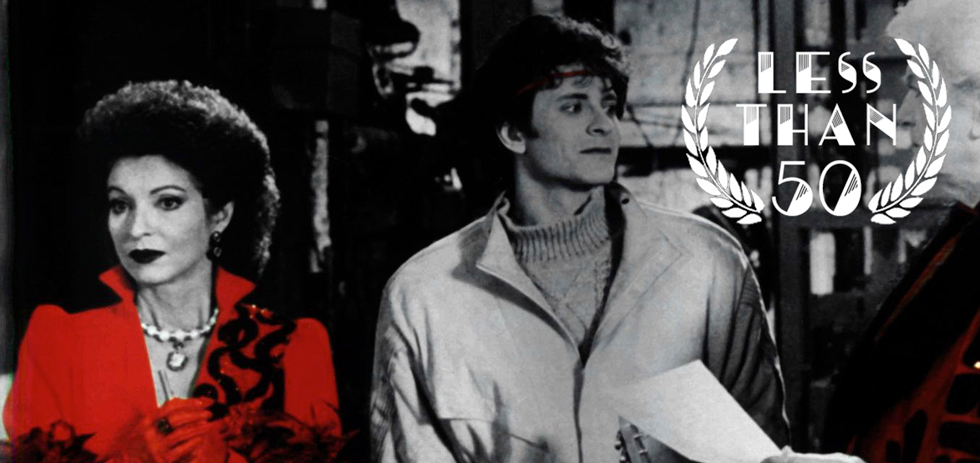In our regular column, Less Than (Five) Zero, we take a look at films that have received less than 50 logged watches on Letterboxd, aiming to discover hidden gems in independent and world cinema. This week Brad Mariano once again delves into the strange realm that is Jacques Demy’s later career.
Date Watched: 23rd July, 2015
Letterboxd Views (at the time of viewing): 41
Jacques Demy’s little-known rock opera Parking provides us with this week’s film, though it isn’t the first Demy to grace the column, nor will it necessarily be the last; it’s hard to think of another director of his stature with so many ignored projects that at least at face value would appear to be so connected to their cherished works, styles and themes. Parking is one of the most intriguing at the level of its premise – an 80s rock musical functioning as a tribute to Jean Cocteau, and its connection to some of Demy’s career-long interests (to put them very broadly, the intersection between musicals and fairytales) is likewise pretty easily read. And yet even compared to other late career risky films like The Pied Piper, Parking does come up short. Were a film to be judged solely on intention it could probably pass with a vague stamp of endorsement, but sadly it doesn’t have many ideas beyond its high concept premise, and its execution is often lacking. However, what ultimately sinks the film is the very same component which elevates The Umbrellas of Cherbourg and The Young Girls of Rochefort to some of the most loved and acclaimed films of all time, which is the contributions of composer Michel Legrand.
The film is a modern update of the legend of Orpheus in the underworld, notably the basis for the Jean Cocteau’s 1950 Orpheus film to which Demy’s is consciously indebted, where the tragic hero sauntered around Bohemian cafes. Our Orpheus (Francis Huster) is a popular rock musician, whose muse/wife (Keiko Ito) commits suicide, and he must go to the underworld and deal with Hades (Jean Marais, the legendary French actor who played Orpheus in Cocteau’s film) to rescue her. In addition to lengthy concert scenes and other interpersonal drama, this makes up the crux of the narrative, and parts certainly are done with style. The underworld is an underground parking garage (presumably what the title refers to) in downtown Paris. Though the underworld scenes are shot in black and white, save for splashes of red; an often stunning visual scheme that surely influenced Wim Wenders similar colour scheme in Wings of Desire two years later (I can’t in good conscience suggest Spielberg got his cues for Schindler’s List here as well, but it isn’t impossible). These are the most striking scenes, clever production design down to the direction of extras lumbering around like lost souls lend the film a certain poetry, though its the above ground scenes that make up most of the complaints as well as runtime.
Ostensibly a rock musical, the film fails due to its uncertain aesthetic and quite awful music that don’t sell it as such. Orpheus might have appropriately flashy, ostentatious glam rock attire (jumpsuits and headbands aplenty), but the overly sanitised concerts of silent crowd members don’t convince, to say nothing of the terrible original songs. I’ve always maintained that the French language is for speaking, not singing; its laboured and vowel-heavy enunciations and soft endings can add grace and elegance to quotidian encounters on the street, but matched to music generally feels overly strained. Even accounting for this bias of mine, Parking’s music misses the mark, full of awkward and wordy lyrics that make Orpheus’ appeal as a singer in the film’s universe hard to comprehend. However, Michel Legrand’s score is the main problem; the film’s music sounds like a Michel Legrand-Demy score almost to the point of parody, like both wanted the film to sound like Cherbourg while parading under the guise of 80s glam rock aesthetic, with some token synth loops thrown in to the love ballads for good measure. It’s not a rock musical, it’s a second tier Demy musical and this inability to embrace or experiment with other musical styles despite taking creative risks elsewhere makes this a frustrating film to sit through.
Exactly what the film does aspire to is then hard to guess. A homage to Cocteau seems redundant in the wake of Donkey Skin, an anachronistic fairy tale that I like a lot more (and which gives Marais a lot more to do), and as discussed, Demy evidently has no real interest in the excess of 80s pop culture. There’s fascinating subtext now – Demy died of HIV/AIDS, and this film in its toothlessness and clean-cut image of a (bisexual) pop star almost feels like a perfect time capsule evoking the naiveté surrounding the disease and culture of the time, though that’s an exercise in rather tactless, critic-imposed narrative than meaningful engagement with the artist’s intention. Less contentious is a relatively obvious connection with John Lennon when Orpheus is likewise shot; in fact that’s the only real explanation for the casting of Keiko Ito, an actress with hardly any other credited films and whose ethnicity wouldn’t attract notice were it not for the otherwise almost complete dearth of casting people of colour which forms an eyebrow-raising footnote to the entire French New Wave movement. But the Lennon/Orpheus as martyr angle isn’t given a lot of oxygen and doesn’t form anything of value beyond a basic cultural reference. Ultimately, this film is interesting in parts to Demy/New Wave completists, but only as a curiosity as another example of the truly strange auteur projects that were financed in the tail end of the auteur heyday.
